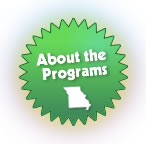Missouri Statewide Mentoring Programs
 Missouri Statewide Mentoring Programs -- why we do it, how it works, and how we measure program success.
Missouri Statewide Mentoring Programs -- why we do it, how it works, and how we measure program success.
The Missouri Department of Elementary and Secondary Education, Office of College & Career Readiness, offers new and returning teachers and counselors an excellent opportunity to become informed of specific strategies and information related to their work.
Why We Do It.
To assist Missouri schools in retaining quality teachers and counselors, the Missouri Office of College & Career Readiness (formerly the Division of Career Education), implemented the career education teacher mentoring program in 2003. A mentoring program for new Professional School Counselors was added in 2005. Both programs meet the minimum two-year participation in a mentoring program requirement set forth in the current Educator Certification Requirements.
Visit the DESE website for additional information about career education teacher certification requirements.
Additional information concerning certification requirements for professional school counselors can be obtained at the DESE website.
The Career Education Statewide Mentoring Programs for New and Returning Teachers and Professional School Counselors offer an efficient and effective partnership with the local district's induction activities, emphasizing content-specific pedagogy for new teachers and, for new counselors, the opportunity to enhance their skills in implementing a comprehensive guidance program within their district.
 By establishing support systems that welcome newcomers to the profession and help them succeed, the intended impact of the Career Education Statewide Mentoring Programs are to improve instructional effectiveness within their content area for teachers and to fully implement an effective comprehensive guidance program for all school counselors. Many local mentoring programs, designed and established at the district level, are orientations to school operations, rules, and guidelines. The culture of the school, the district, and the community are also touched upon, but in-depth training for the teachers in content-specific instructional practices, student discipline and classroom management is limited. For the counselors, it is an opportunity to learn what a fully implemented comprehensive guidance program looks like and some tools that can be used to prove their program is effective to their administration.
By establishing support systems that welcome newcomers to the profession and help them succeed, the intended impact of the Career Education Statewide Mentoring Programs are to improve instructional effectiveness within their content area for teachers and to fully implement an effective comprehensive guidance program for all school counselors. Many local mentoring programs, designed and established at the district level, are orientations to school operations, rules, and guidelines. The culture of the school, the district, and the community are also touched upon, but in-depth training for the teachers in content-specific instructional practices, student discipline and classroom management is limited. For the counselors, it is an opportunity to learn what a fully implemented comprehensive guidance program looks like and some tools that can be used to prove their program is effective to their administration.
How It Works.
The Career Education Statewide Mentoring Programsí content and delivery structures are guided by national and state standards. New and returning teachers and counselors are identified through the efforts of school district personnel, teacher and counselor educators, other teachers and counselors, and new teacher/counselor workshops.
Teacher Mentoring.
Mentor/Protégé teams are established by Department of Elementary and Secondary Education (DESE) personnel. Proteges are assigned a content-specific mentor within their region, but outside their school district. The mentor/protégé teams attend a mentoring kickoff meeting in September of their first year in the program. At the kickoff meeting the teams will determine four experiences the protégé will complete throughout the school year. Experiences are decided based on protégé needs and district/school requirements. In addition to the experiences, mentor/protégé teams schedule a face-to-face school visit and attend a mid-year group meeting during the first year. Teams meet again prior to the beginning of their second year to re-assess protégé needs and determine four experiences that the mentor can assist the protégé in completing during the second year of the program.
Counselor Mentoring.
Counselor mentoring teams are determined by MSCA Regional Chairs, who pair protégés with a mentor within the same region. Mentoring teams attend group meetings within each region where they can network with their colleagues and determine timelines for completing projects. The first year of the program, projects focus on MSIP requirements for guidance programs and what it means to fully implement a comprehensive guidance program. The second year contains a variety of experiences related to enhancing and evaluating a comprehensive guidance program.
How We Measure Program Success.
 The mentoring programs in Missouri are evaluated annually by mentors and protégés who complete an online evaluation. The results of the evaluations are reviewed by DESE personnel to determine program improvement. In addition to the online evaluation, in-person interviews are conducted with volunteer protégés within a year of completing the program. The personal interviews in conjunction with core data teacher and counselor retention records help to determine the success of each of the programs in retaining new career education teachers and professional school counselors within Missouri.
The mentoring programs in Missouri are evaluated annually by mentors and protégés who complete an online evaluation. The results of the evaluations are reviewed by DESE personnel to determine program improvement. In addition to the online evaluation, in-person interviews are conducted with volunteer protégés within a year of completing the program. The personal interviews in conjunction with core data teacher and counselor retention records help to determine the success of each of the programs in retaining new career education teachers and professional school counselors within Missouri.
A school administration committed to the Career Education Statewide Mentoring Program understands the value of mentoring and its potential impact on teaching and student success.
It is also an attractive incentive for new teachers and counselors. It is about taking the first job where they feel that they will fit, survive, and eventually thrive.




